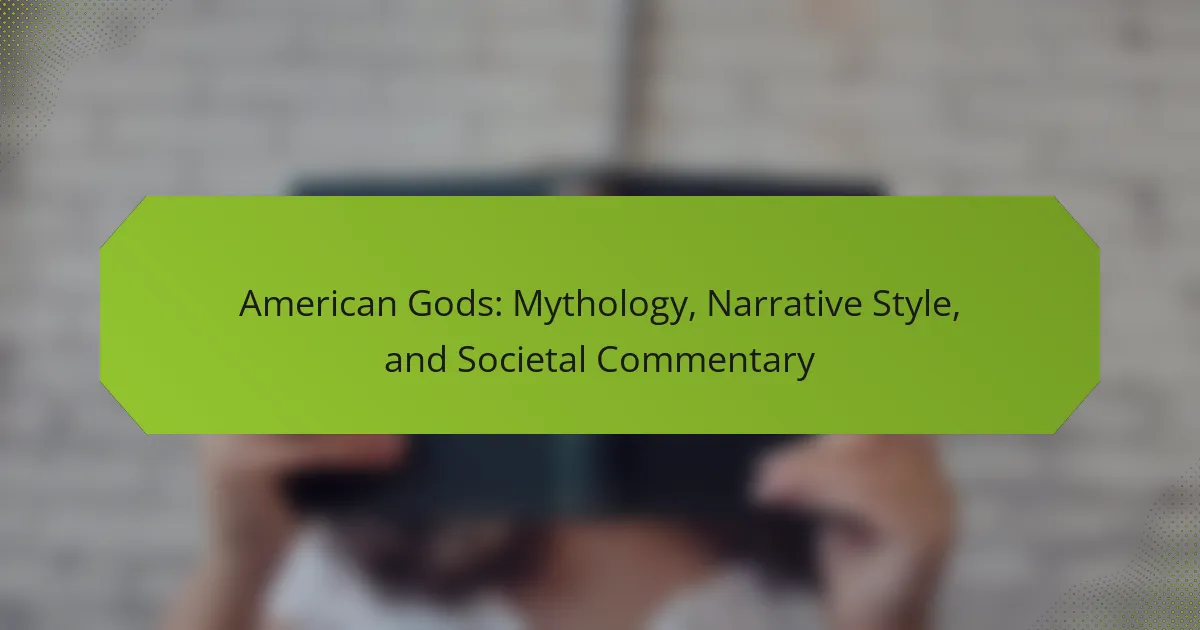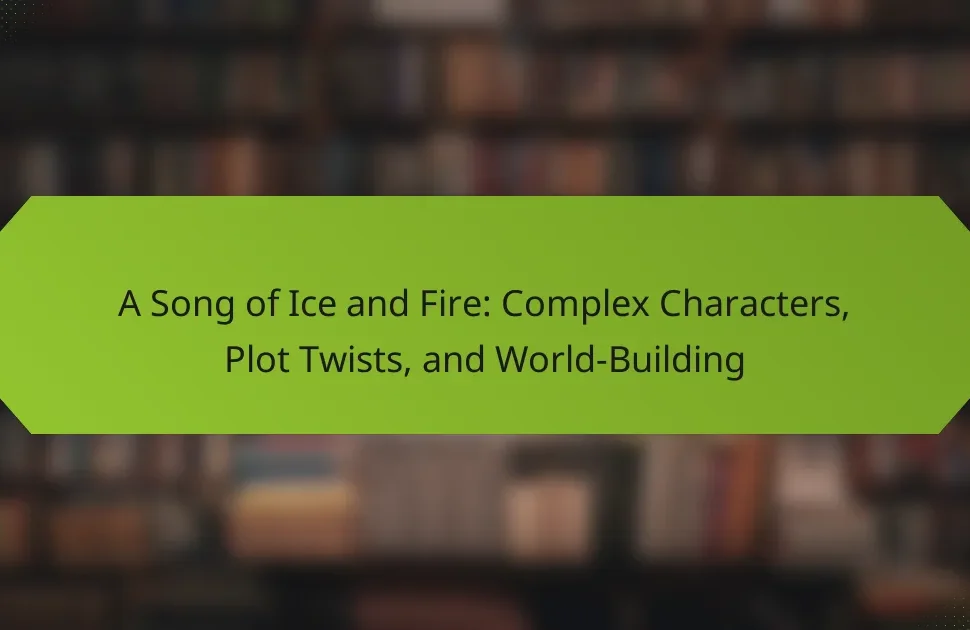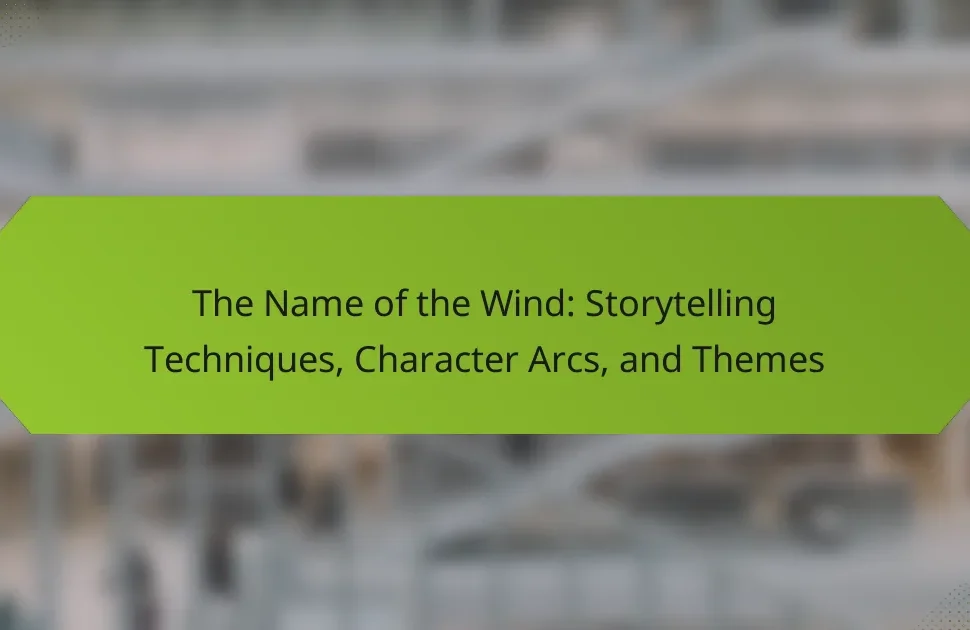American Gods intricately weaves ancient mythology into contemporary society, exploring the clash between old and new deities. The narrative employs diverse styles such as magical realism and non-linear storytelling, enhancing its cultural critique. It examines belief, identity, and societal changes through character arcs that reflect modern challenges. The series has significantly influenced popular culture, prompting discussions on faith, cultural relevance, and inclusive storytelling.
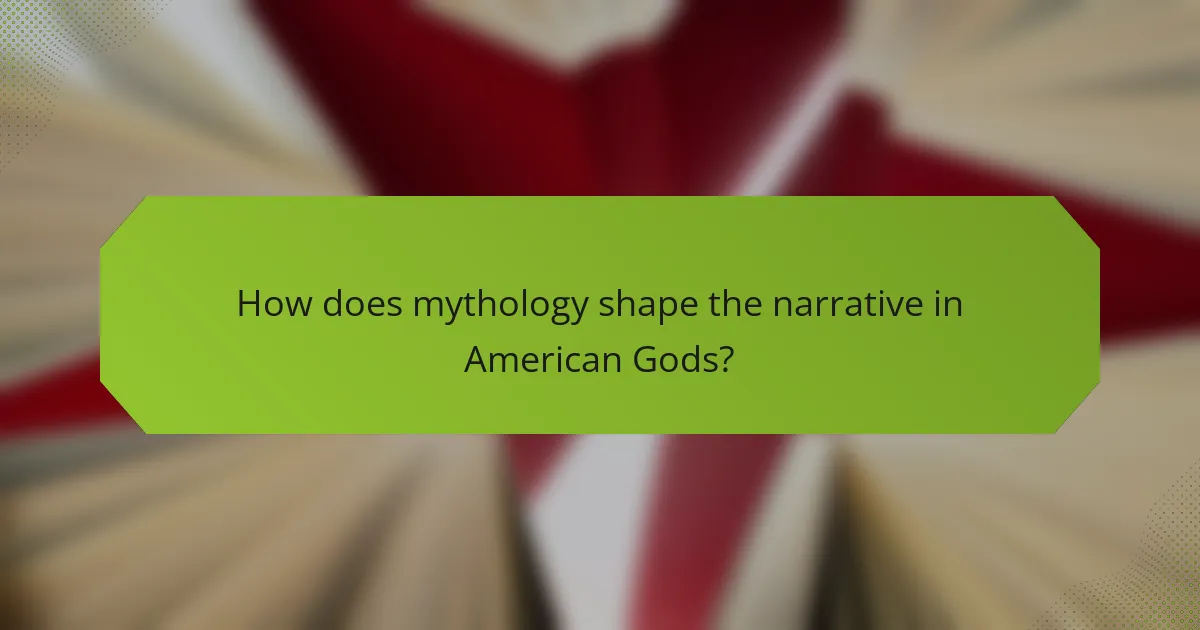
How does mythology shape the narrative in American Gods?
Mythology profoundly influences the narrative in American Gods by weaving ancient deities into contemporary society. The clash between old gods and new reflects cultural shifts and societal commentary. Neil Gaiman uses mythological elements to explore identity, belief, and the human experience. This unique narrative style engages readers, prompting reflection on the relevance of mythology today.
What are the key mythological figures represented in American Gods?
Key mythological figures in “American Gods” include Odin, the All-Father, representing knowledge and power; Mr. Wednesday, a manifestation of Odin in modern America; and Anansi, the trickster spider god symbolizing storytelling and cunning. Other notable figures are Czernobog, the Slavic god of darkness, and Easter, the goddess of spring and renewal. These characters embody various aspects of mythology, reflecting societal themes and the clash between old and new beliefs.
How do ancient myths influence modern storytelling in the series?
Ancient myths significantly shape modern storytelling in “American Gods” through their integration into narrative style and societal commentary. The series reinterprets mythological figures, blending them with contemporary themes to explore identity and belief. This fusion creates a unique narrative that reflects societal changes and cultural tensions. Characters embody ancient deities, highlighting their relevance in modern contexts, thus bridging past and present. The storytelling method emphasizes the clash between old and new, illustrating how myths continue to influence contemporary life and thought.
Which cultural myths are uniquely highlighted for different audiences?
“American Gods” uniquely highlights cultural myths for different audiences by intertwining various mythologies with contemporary issues. Each character represents distinct cultural backgrounds, reflecting societal values and conflicts. For instance, the inclusion of deities from African, Native American, and European traditions showcases diverse perspectives on belief and identity. This narrative style fosters a rich dialogue about the relevance of mythology in modern society. Additionally, the portrayal of gods struggling for relevance mirrors the audience’s own search for meaning in a rapidly changing world.

What narrative styles are utilized in American Gods?
American Gods employs multiple narrative styles, including magical realism, stream of consciousness, and non-linear storytelling. These styles enhance the exploration of mythology and societal commentary. Magical realism blends the ordinary with the extraordinary, allowing gods to coexist with modern life. Stream of consciousness offers insight into characters’ thoughts, revealing their motivations. Non-linear storytelling creates a complex narrative structure that reflects the fragmented nature of American identity. Together, these styles deepen the thematic richness and cultural critique present in the novel.
How does Neil Gaiman blend different genres within the narrative?
Neil Gaiman expertly blends different genres in “American Gods” by merging mythology, fantasy, and social commentary. This narrative style creates a rich tapestry that reflects contemporary issues through mythological lenses. Gaiman’s unique attribute lies in his ability to weave ancient deities into modern settings, showcasing their relevance. The rare attribute of his work is the seamless integration of diverse genres, allowing for a multifaceted exploration of identity and belief. As a result, readers engage with complex themes while enjoying an adventurous plot.
What role does non-linear storytelling play in character development?
Non-linear storytelling enhances character development by revealing motivations and complexities through fragmented narratives. In “American Gods,” this technique allows characters to unfold in layers, showcasing their pasts and connections to mythology. The disjointed timeline creates a deeper understanding of their struggles and desires. As a result, viewers engage more intimately with each character’s journey, making the narrative more compelling and reflective of societal themes.
How does the use of multiple perspectives enhance the narrative experience?
The use of multiple perspectives in “American Gods” enriches the narrative by offering diverse viewpoints and deepening thematic exploration. This narrative style allows readers to engage with various characters, each representing different cultural myths and societal issues.
By presenting the story through multiple lenses, Neil Gaiman enhances the complexity of the plot and characters, inviting readers to reflect on the interplay between mythology and modernity. This technique fosters a richer understanding of identity, belief, and the clash between old and new.
Moreover, the shifting perspectives create a dynamic narrative rhythm, maintaining reader interest and engagement. This multifaceted approach allows for a nuanced commentary on American society, highlighting the diverse experiences and challenges faced by individuals.
Ultimately, the use of multiple perspectives in “American Gods” transforms the narrative experience, making it both profound and thought-provoking.
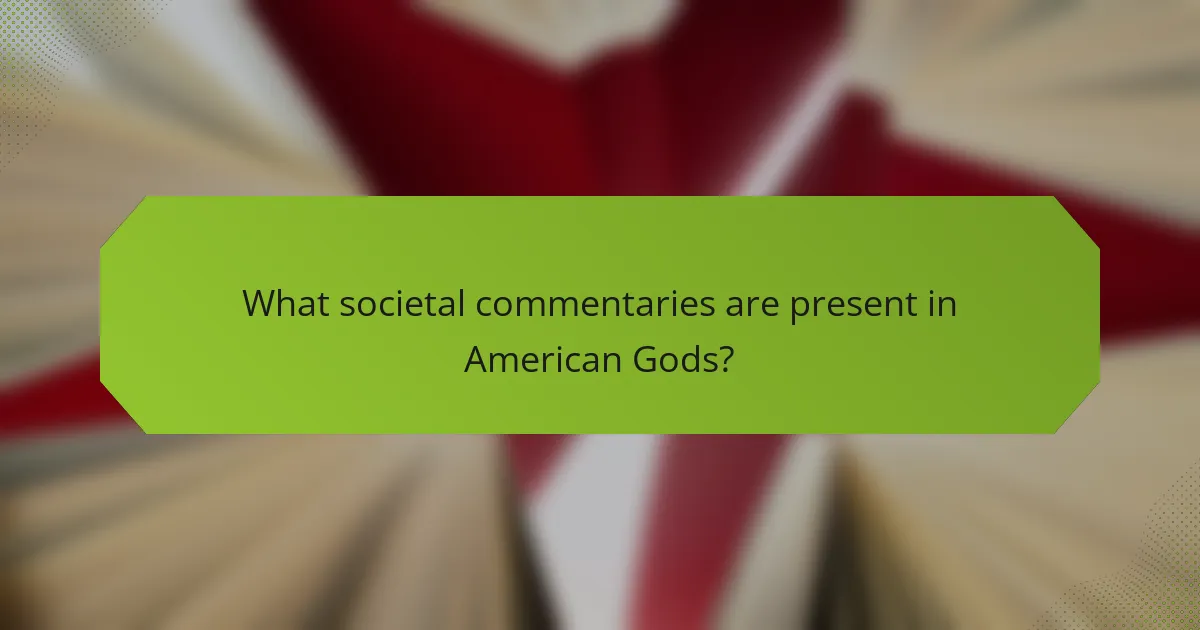
What societal commentaries are present in American Gods?
American Gods critiques modern society’s relationship with belief and identity. It contrasts ancient mythologies with contemporary issues, highlighting how cultural values evolve. The narrative style blends magical realism with diverse perspectives, reflecting the fragmentation of American identity. Characters represent various societal aspects, illustrating the clash between old gods and new consumerist deities. Themes of immigration and multiculturalism underscore the changing landscape of belief systems in America.
How does the series critique contemporary American culture?
“American Gods” critiques contemporary American culture by juxtaposing traditional mythology with modern societal issues. The series explores themes of consumerism, identity, and belief systems, highlighting how ancient gods struggle to survive in a world dominated by technology and capitalism. This narrative reflects the erosion of spiritual values in favor of materialism. As a result, the characters embody various aspects of American life, illustrating the conflict between old and new beliefs. Through its unique narrative style, the series prompts viewers to question their own values and the cultural landscape they inhabit.
Which social issues are explored through the lens of mythology?
American Gods explores social issues such as identity, immigration, and the clash of old and new beliefs through mythology. The narrative reflects contemporary societal challenges, illustrating how ancient gods represent modern struggles. For instance, the character Mr. Wednesday embodies the challenges faced by marginalized communities in adapting to a changing world. The series critiques consumerism and the loss of cultural heritage, emphasizing the importance of storytelling in shaping societal values. Through its diverse characters, it highlights the complexity of American identity and the ongoing conflict between tradition and modernity.
What reflections on belief systems can be drawn from the story?
The story of “American Gods” reflects on belief systems by illustrating the clash between old and new deities. This narrative reveals how modern society often prioritizes materialism over traditional spiritual values. The characters embody various belief systems, showcasing the impact of cultural shifts on faith and identity. As a result, the story critiques contemporary society’s loss of connection to myth and meaning. Through its rich mythology and societal commentary, “American Gods” invites readers to reconsider their own beliefs and the forces that shape them.
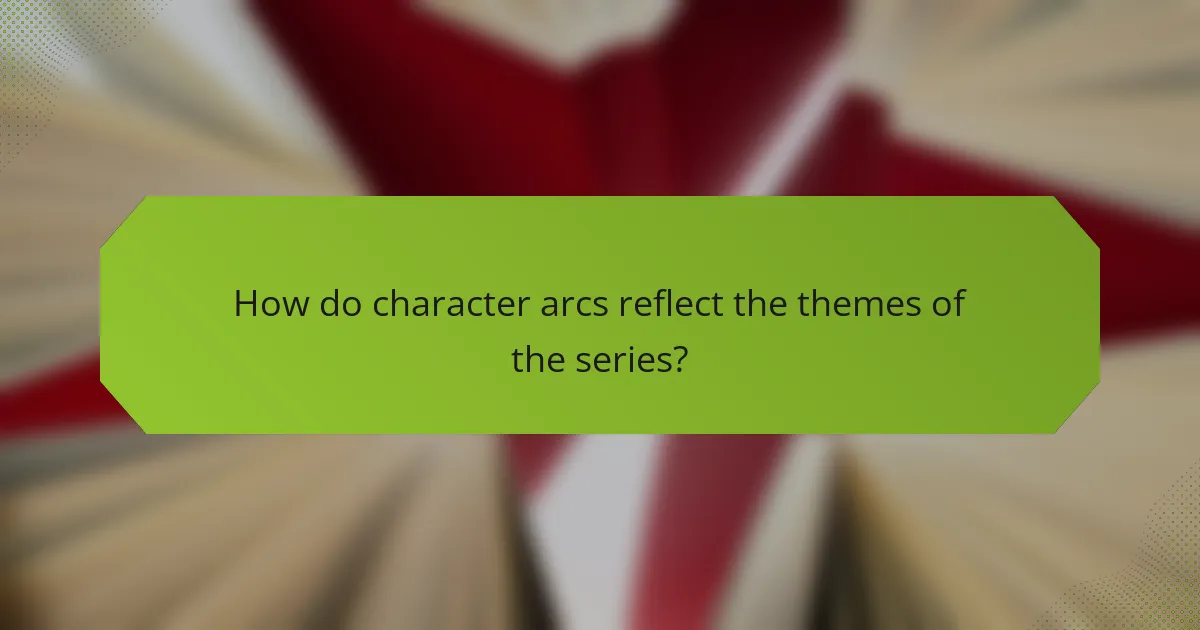
How do character arcs reflect the themes of the series?
Character arcs in “American Gods” vividly reflect the series’ themes of identity, belief, and cultural conflict. Each character’s journey embodies the struggle between old and new gods, illustrating societal changes and the impact of modernity on tradition. For instance, Shadow Moon’s transformation from a passive figure to an active participant symbolizes the awakening of individual agency in a rapidly evolving world. As characters confront their pasts, the narrative critiques the loss of cultural heritage and highlights the importance of personal mythology. This interplay between character development and thematic exploration enriches the viewer’s understanding of the complex societal commentary woven throughout the series.
Which characters embody the conflict between old and new gods?
The characters that embody the conflict between old and new gods in “American Gods” include Mr. Wednesday, who represents the old gods, and Shadow Moon, who navigates between these worlds. Mr. Wednesday, an incarnation of Odin, struggles to maintain relevance against the rising power of new deities like Technology and Media. This conflict illustrates the broader societal commentary on changing beliefs and the impact of modernity on traditional values. The character dynamics showcase the tension between established mythologies and contemporary influences, highlighting the struggle for existence in a rapidly evolving cultural landscape.
How do personal journeys mirror larger societal changes?
Personal journeys in “American Gods” reflect larger societal changes by illustrating the clash between traditional beliefs and modern values. Characters experience transformations that parallel the evolution of American culture. For instance, the conflict between old gods and new technologies symbolizes the struggle between heritage and progress. This narrative style emphasizes how individual stories can mirror societal dynamics, revealing deeper truths about identity and belief systems. As a result, the novel serves as a commentary on the impact of globalization and cultural shifts in America.
What unique attributes do certain characters possess that drive the narrative?
Certain characters in “American Gods” possess unique attributes that drive the narrative forward. For instance, Mr. Wednesday embodies cunning and manipulation, representing the struggle of old gods against modernity. Anansi, with his trickster nature, highlights themes of storytelling and cultural heritage. These traits deepen the exploration of identity and belief systems in contemporary society. Additionally, the character of Shadow Moon showcases resilience and transformation, reflecting personal and societal change. Each character’s distinct qualities contribute to the overarching commentary on mythology and its relevance today.
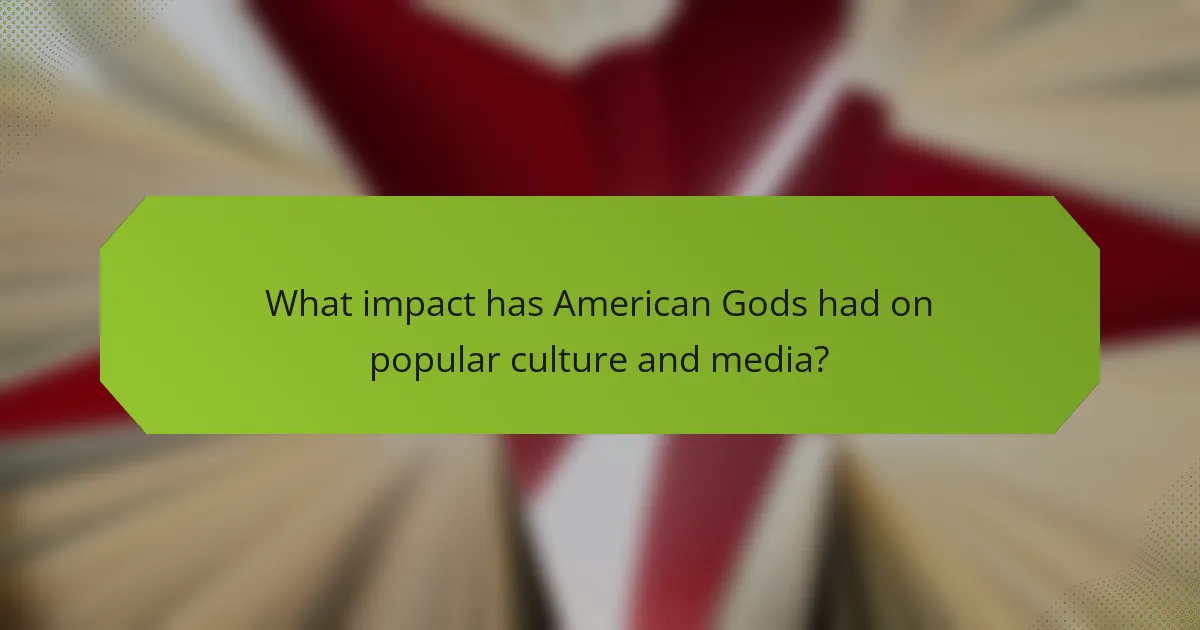
What impact has American Gods had on popular culture and media?
American Gods has significantly influenced popular culture and media through its unique blend of mythology, narrative style, and societal commentary. The series has introduced viewers to diverse mythological figures, reshaping their perceptions of ancient stories in a modern context. Its non-linear narrative style has inspired other creators to experiment with storytelling techniques, emphasizing character depth and thematic complexity.
The show’s exploration of themes such as belief, identity, and the clash between old and new gods resonates with contemporary societal issues. As a result, it has sparked discussions on faith and cultural relevance, impacting literature, television, and film. The adaptation has also led to a resurgence of interest in Neil Gaiman’s work, influencing a new generation of writers and creators.
Additionally, American Gods has contributed to the visibility of diverse voices in media, showcasing a range of cultural backgrounds and experiences. This representation has encouraged more inclusive storytelling across various platforms. Overall, American Gods serves as a pivotal reference point in discussions about the intersection of mythology and modernity in popular culture.
How has the series influenced other works of fiction?
“American Gods” has significantly influenced other works of fiction through its innovative narrative style and rich mythology. The blending of various mythologies with contemporary settings has inspired authors to explore similar themes. This series has encouraged a deeper examination of societal commentary within fantasy, prompting writers to address complex cultural issues. Additionally, its unique structure, combining prose with elements of poetry and folklore, has led to a trend of experimental storytelling in modern literature. The impact is evident in various genres, particularly in urban fantasy and magical realism.
What cultural phenomena have emerged from the series’ themes?
Cultural phenomena from “American Gods” include the revival of interest in mythology, discussions on identity, and critiques of consumerism. The series intertwines ancient beliefs with modern societal issues, prompting viewers to reconsider cultural narratives. Its narrative style encourages fan theories and community engagement, fostering a unique cultural discourse. Additionally, the blending of genres has inspired adaptations in various media, influencing contemporary storytelling.
Which adaptations have successfully captured the essence of the original narrative?
Several adaptations of “American Gods” have effectively captured the essence of Neil Gaiman’s original narrative. The Starz television series successfully translates the complex mythology and societal commentary through visual storytelling and character development. It emphasizes the clash between old and new gods, reflecting contemporary issues such as identity and belief. The graphic novel adaptation maintains the narrative’s core themes while offering a unique visual interpretation that enhances the storytelling. Each adaptation, while distinct, preserves Gaiman’s intricate narrative style and thematic depth, ensuring the original essence resonates with new audiences.
What lessons can be learned from American Gods for future storytelling?
American Gods teaches valuable lessons for future storytelling by blending mythology with contemporary themes. It emphasizes the importance of character depth and cultural relevance. The narrative style showcases the power of non-linear storytelling, which can engage audiences in unique ways. Additionally, the societal commentary on belief systems encourages writers to explore complex themes that resonate with modern audiences, enriching the narrative experience.
